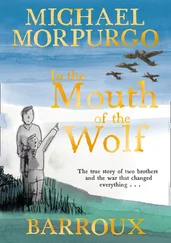“And you’re different because they can’t quite bring themselves to treat you like any other small boy. You’re a special problem for them, and they’re going to treat you like one. Just don’t take it to heart. Don’t think you’re a special problem. None of it is anyone’s fault, that’s the thing to remember.” I must have shown some reaction to this mention of fault, for she turned toward me, but she had misunderstood. “They all … they all mean well. You’re a lucky boy to have so many people love you. Just don’t let them drive you crazy.”
“I won’t.” We’d begun our slow descent now, and she was quiet for a moment. “Are they nice? The people there?”
“The people? In Guatemala, you mean? Oh, sure, they are, they’re grand. You’d like them—they’re like the Irish.” This seemed to strike her as a fine joke, and she put her head back and laughed, and I found myself chuckling along with her.
When the ride was finished, she patted me on the head and asked after Grandma Flynn.
“She’s fine,” I said without thinking.
“Oh, Lord, no, I’m sure she’s not fine. She’s lost her daughter, and they were great friends, your mother and Mrs. Flynn, great friends. Be very good for her.”
“I will.”
She nodded, then looked away in distraction, and I remembered that she had lost a brother. After a moment she fished a half-dollar out of some secret compartment in her habit.
“You’re a nice boy, Danny. I enjoyed our rides together.”
“Me, too, Sis … Aunt Teresa.”
“Well done. Here.” She handed me the fifty-cent piece, made a brisk turn on her heel, and walked off, tall and handsome and self-assured, ignoring the many curious faces that took a moment to gawk at her. My Uncle Tom had once remarked with a rueful note that it was “too bad that one became a nun.” Uncle Mike had simply said, “Yeah, what a waste,” and though I didn’t understand what either of them meant, I knew I liked her, too.
In Riverview I entered a tiny porthole into the adult world. I was a watcher of people, I studied strangers the way I eavesdropped on my uncles, and the rickety old park rewarded me with dark glimpses into the behavior of the species. I saw fights there between older boys and once between two very drunken men outside the beer garden. They were both fat, both bleeding from scalp cuts that exaggerated their injuries and made the scene wonderfully lurid. The police came rushing over from the little police station inside the park and collared them both. As they pulled the men away, someone clapped, whether for the action of the police or the quality of the fisticuffs, I wasn’t sure.
There were other tensions in the park. I always stopped to watch at the place where you tried to make a man in a cage fall into a tub of water by hitting a target with a thrown ball. The men within the little cage were usually black, the ones outside were white, sometimes cocky young ones with good aim, but usually older men, sweating, grunting drunks. The black men sat on little perches like dark-skinned birds and laughed at the efforts of their tormentors. The more the men threw and missed, the angrier they became, muttering threats and racial epithets at the black men, who responded with loud doubts about the white men’s manhood. Once as I watched this little two-headed rite of racist hostility, my grandmother grabbed my arm and yanked me away. Behind me I heard my uncles chuckling at the scene, then a loud shout as one of the black men went into the drink.
On a humid night toward the end of that first summer, I was patrolling with my cousin Matt when we came upon a scene that struck me as something from a movie. Two groups of young men had come upon one another, four or five on a side. One group included my uncles, Tom and Mike, and a pair of their friends. The other group was led by Philly Clark. Perhaps someone had put a shoulder into someone else in the crowded midway, perhaps there had been a choice remark tossed over a shoulder. Something had already happened, I couldn’t tell what, but it was clear from the way the men had formed a pair of facing lines, and from the way they all watched Philly and my Uncle Tom, that these young men all expected trouble.
We moved closer ’til we could see the angry faces—some were angry, though a tall thin guy behind Philly looked nervous, and my Uncle Mike simply looked like a man who has found himself in an unpleasant situation out of his control. In truth these two groups had faced each other before over other matters. From opposite ends of the neighborhood, they viewed each other as rivals, for jobs, for girls, for status. Matters usually crested during the summer, for both groups fielded baseball teams that faced each other in the various men’s leagues in the parks. There had been individual fights, and at least one group effort.
I had heard Philly Clark’s name in my grandmother’s house. My uncles talked about him and my grandmother had called him a “hooligan.” From what little I’d been given, I pieced together that there was trouble between Philly and Uncle Tom, part but not all of it over a girl. At that time, I knew no more about her. More than this, they detested each other. Philly was tall and handsome, had been a star athlete at Lane Tech and, it was said, was well-connected, and not only because his father was a precinct captain.
Now, he stood just a couple of feet from my uncle, head thrust forward belligerently. He was speaking to Tom, pointing to emphasize his words, and his finger seemed to come within touching distance of my uncle’s face. Tom stood back on his heels and looked up at him—he was four or five inches shorter than Philly. He had an oddly satisfied look on his face, as though the whole scene was amusing him. If it was, he was alone in his amusement.
“Oh, boy,” I heard Matt say. “They’re gonna fight!” We moved closer so that I could make out some of Philly’s words.
“I stay away from what’s yours, you keep away from what’s mine, you got that?”When my uncle said nothing, Philly poked him in the chest with the finger. “You got that?”
Tom ignored the finger. “How can she be yours if she’s with me? Answer me that, Philly.”
“She ain’t gonna be with you, not ever, not if you want to live a long time. You got that?” Philly jabbed him again with the finger, and I thought he might throw a punch. My uncle just took a half-step back and looked at Philly’s hand.
“You tired of that finger?” Tom asked. He sounded very calm. “You tired of that nice shirt, those slacks, those fancy shoes?”
“Oh, tough guy, I’m terrified,” Philly said with a mirthless smile.
“No, you’re the tough guy, everybody shits green ink when you walk by, but if you don’t step aside and let me pass, I’ll give you enough trouble to last you for a while.”
“I can take you, Flynn.”
“What’re you, sixteen, Philly? You still think the girls like a guy who can knock somebody around. Now get out of my way or you’re gonna wish you had.”
A long moment passed as Philly considered whether to take things up a notch. People can smell a street fight coming, and a small crowd had formed around my uncles and the other men.
“I kicked your ass before, Flynn,” Philly said so that he could be heard over the park noises.
“Long time ago. Ancient history, kid stuff. And you never wanted to fight me in a ring.” Tom grinned at him. “Tony Zale gave Graziano a rematch, Philly.”
“Oh, you’ll get a rematch all right,” Philly said, but he was moving away, giving Tom a path.
My uncle walked straight ahead, looking neither left nor right, and his group followed him.
“Just remember what I said, Flynn,” Philly said to my uncle’s departing back. Then he and the others broke into a little circle, chattering all at once. One of them was patting Philly on the back, but I could see Philly Clark’s eyes, and I saw that the big handsome man in the good clothes had lost face.
Читать дальше












